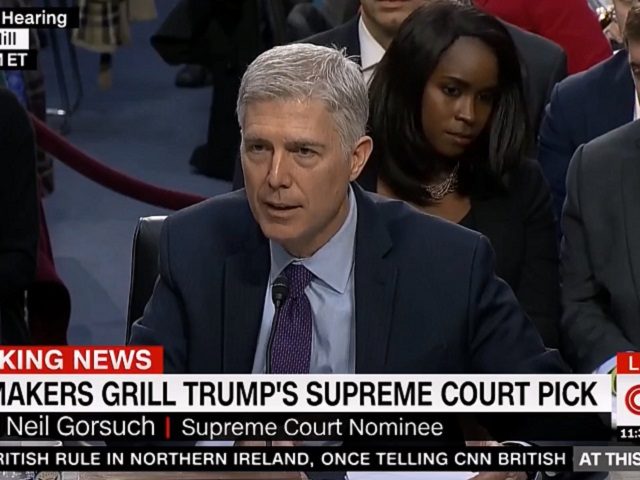During his confirmation hearing on Tuesday, Supreme Court nominee Judge Neil Gorsuch responded to questions on whether the Constitution allows bans based on religion by stating that while he can’t say how he’d rule on a Muslim ban or anything like it, “we have, not just the First Amendment Free Exercise Clause in this country, very important protection. We have not just the equal protection guarantee of the 14th Amendment, which prohibits discrimination on the basis of race, gender, ethnicity. We also have the Religious Freedom Restoration Act” and that when it comes to judicial review of presidential national security determinations, he would apply the Youngstown standard and “no man is above the law.”
Gorsuch was asked by Senator Pat Leahy (D-VT) if the First Amendment allows for religious litmus tests for entry into the US. He responded that the issue was being actively litigated. Leahy then clarified his question that he wasn’t talking about the ongoing litigation about the president’s travel ban, but rather about a blanket religious test. Gorsuch answered, “Senator, we have a Free Exercise Clause that protects the free exercise of religious liberties by all persons in this country. If you’re asking how I would apply it to a specific case, I can’t talk about that, for understandable reasons.”
When asked if the president could ban all Jews or Israelis from the US, Gorsuch responded, “We have a Constitution, and it does guarantee free exercise. It also guarantees equal protection of the laws, and a whole lot else besides. And the Supreme Court in Zadvydas has held that due process rights extend even to undocumented persons in this country. I will apply the law. I will apply the law faithfully and fearlessly, and without regard to persons.”
Gorsuch was later asked if he agreed that “there should not be a religious test in the United States?” He responded that he’d need more specifics. When asked specifically if there should be a religious test for military service, he answered that that would “inappropriate,” and “against the law.”
When asked if you could ban someone solely due to their religion, Gorsuch answered, “Senator, we have, not just the First Amendment Free Exercise Clause in this country, very important protection. We have not just the equal protection guarantee of the 14th Amendment, which prohibits discrimination on the basis of race, gender, ethnicity. We also have the Religious Freedom Restoration Act…and that imposes an even higher standard on the government than the First Amendment when it comes to religious discrimination. It says that there — if there’s any sincerely held religious belief, earnestly held religious belief, the government must meet strict scrutiny before it may regulate on that basis. Strict scrutiny being the highest standard known in American law.”
Gorsuch further stated that he wasn’t going to say anything that would give anyone any idea how he’d rule on a Muslim ban, or any case like it.
Later, the question turned to whether the president’s national security determinations were reviewable by the court. He responded, “Senator, no man is above the law.” Gorsuch added, “Senator, as a judge, I apply the law, and the law here, I think, is Youngstown. I look to Justice Jackson, and Justice Jackson wrote a brilliant opinion in Youngstown. … And the Youngstown system of analysis, when it comes to presidential power and foreign affairs, has three categories. One, the president acting with the concurrence of Congress. That’s when the president was acting at his greatest strength, because there are shared responsibilities in our Constitution. He has commander-in-chief power. This body has power of the purse, and the power to declare war assigned to it in Article I. When the Congress and the president are in disagreement, that’s the other end of the spectrum. The president there is acting with — at the lowest ebb of his authority. When Congress is silent, that’s the gray area in between. That’s how a court, as opposed to a lawyer or advocate. approaches the problem.”
Follow Ian Hanchett on Twitter @IanHanchett

COMMENTS
Please let us know if you're having issues with commenting.